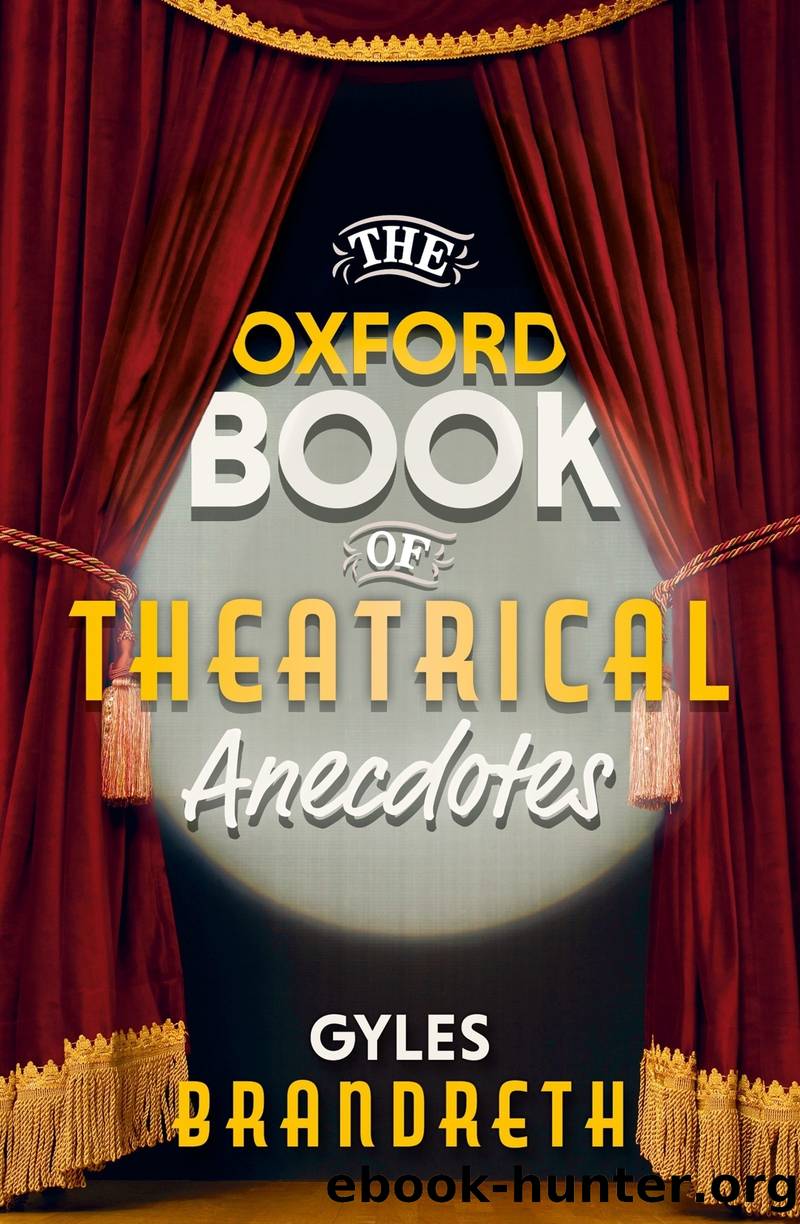The Oxford Book of Theatrical Anecdotes by Gyles Brandreth

Author:Gyles Brandreth [Brandreth, Gyles]
Language: eng
Format: epub
ISBN: 9780191066528
Publisher: OUP Oxford
Published: 2020-08-07T00:00:00+00:00
ALBERT FINNEY
(1936â2019)
Albert Finney was a British stage and film star, whose distinguished career began auspiciously when, in 1959, he was at Stratford-upon-Avon understudying the great Sir Laurence Olivier in Coriolanus. This recollection comes from an interview with Clive Goodwin.
Q.âAt Stratford you had the dream of every understudy come true. Laurence Olivier injured his leg and you took over the part of Coriolanus.
A.âYes, that was smashing. I donât know what was wrong with my work at Stratford. I mean it was more wrong then than itâs ever been before or since, and I was aware of it being wrong. It was one of those times when you feel that everything you doâyou know that kind of tunnelâand thereâs nothing you can do to get out of it. The more you try to get out of it, the more youâre in it. My work was awful, just vile. Every time I went on the stage I felt, get off, get off, what are you doing? But when I went on for Sir Laurence in Coriolanus, all the difficulties I seemed to be going through left me. Because, first of all, the audience kind of expect you to come on in flannels with a book. Sir Laurence isnât playingâbig groan. His part will be played by AlâAlbert Finney. And then I came on, and I had the costume on, and so they immediately think Iâm talented because Iâve actually got into the clothes. Iâve put the body make-up on and then I start and they canât see the book. And I actually got through it without drying, so they think Iâm very good. If youâre an understudy and you go on, the card youâve actually got in your hand is that they think you might not be able to get through at all, and if you can get through with any degree of professionalism, they think youâre very good. And I kind of felt, get in there. But itâs terrible to hear that announcementâyou know, youâre in your dressing-room putting on the make-upâSir Laurence wonât be playing tonight; terrible groan through the auditorium. Thatâs nice.
But I felt a kind of freedom doing Coriolanus because I had no responsibility; I was his understudy, it didnât matter what happened. It didnât matter if I dried; theyâd expect it. If I fainted, well itâs a lot of pressure on the lad, you know. So I didnât worry. All the clouds which were around the rest of my performances, all the rubbish, the tunnel I felt in with my work, all the difficulties blew out of the window. I just went on and did it. I felt very free. I donât think it was a good Coriolanus. When you hear Sir Laurenceâs tones ringing in your ears for the number of times heâd done the performances, itâs very difficult for you not to be similar, because youâre working on his blueprint. I learnt from that how a great actor can take the peaks and the valleys of a performance, the ups and downs of a character as written, and push them even further apart.
Download
This site does not store any files on its server. We only index and link to content provided by other sites. Please contact the content providers to delete copyright contents if any and email us, we'll remove relevant links or contents immediately.
Shoot Sexy by Ryan Armbrust(17728)
Portrait Mastery in Black & White: Learn the Signature Style of a Legendary Photographer by Tim Kelly(17006)
Adobe Camera Raw For Digital Photographers Only by Rob Sheppard(16976)
Photographically Speaking: A Deeper Look at Creating Stronger Images (Eva Spring's Library) by David duChemin(16687)
Bombshells: Glamour Girls of a Lifetime by Sullivan Steve(14075)
Art Nude Photography Explained: How to Photograph and Understand Great Art Nude Images by Simon Walden(13046)
Perfect Rhythm by Jae(5403)
Pillow Thoughts by Courtney Peppernell(4284)
The Book of Joy by Dalai Lama(3986)
Good by S. Walden(3558)
The Pixar Touch by David A. Price(3439)
A Dictionary of Sociology by Unknown(3085)
Fantastic Beasts: The Crimes of Grindelwald by J. K. Rowling(3058)
Stacked Decks by The Rotenberg Collection(2883)
Humans of New York by Brandon Stanton(2873)
Read This If You Want to Take Great Photographs by Carroll Henry(2711)
On Photography by Susan Sontag(2639)
Insomniac City by Bill Hayes(2558)
Photographic Guide to the Birds of Indonesia by Strange Morten;(2534)
